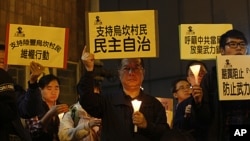Residents in the rebellious southern Chinese village Wukan have ended their mass protest against local authorities after officials offered concessions to resolve their grievances. The villagers were protesting the seizure of their farmland and the death of a fellow resident who died while in government custody.
The most recent troubles in Wukan started in September. At first, angry residents held loud protests against local authorities, whom they accused of confiscating their farmland for development.
Villagers want answers, concilations
The opposition intensified this month with activist Xue Jinbo, who was detained after the protests and then died while in police custody. Authorities say he died of natural causes, but Xue's family members, who have not been able to recover his body, say he was badly beaten.
On Wednesday, village representatives held conciliatory talks with provincial level officials, in which the officials agreed to release three other men detained during the September protests and to re-examine the cause of Xue's death.
Villager Wu Zuidu gave an initial welcome to the government's promise.
Wu says he hopes the officials will be true to their word. He says the villagers have shown their agreement by removing the roadblocks, while police also have pulled back.
For more than a week, Wukan's residents had blocked the main road into the village and kicked out the local officials in outrage about the land confiscation and the death.
Although the protests have ended for now, villager Zhang says she and her neighbors are closely watching what happens next.
Zhang says if the officials do not resolve the issue, Wukan residents will continue to campaign. She adds the villagers are extremely angry and disappointed that authorities could detain someone like Xue Jinbo and, in her words, “beat him to death".
At a news conference earlier this week, Zheng Yanhong, the party secretary of Shanwei, the area that oversees Wukan, criticized the villagers for what he called “causing trouble".
Zheng says it has been very costly for the local government to deploy hundreds of armed police around the village.
In an impassioned plea, he also urges the villagers to have sympathy on government officials whose lives, he says, are getting more difficult.
He says their responsibilities are increasing and their power and leverage are fading. He says the public has become more demanding and difficult to, in his words, manage.
Bolder, more demanding
Sharon Hom, of the New York-based organization Human Rights in China, says the Wukan incident reflects an important and growing refusal by ordinary Chinese to simply accept the government's explanations for everything. She points to public anger after a train crash in the eastern town, Wenzhou, in July as another similar example.
“It's a growing demand for accountability in incidents like this. And, you see it as part of demanding for accountability and some truth-telling in the Wenzhou train crashes - the fury of people just not being told the truth,” Hom said.
And, although state-run media reports on the events in Wukan were scarce, Chinese engaged in a lively debate online.
Many comments welcomed the non-violent resolution of the tensions there, while some said Wukan villagers had obtained a victory. Others, though, expressed concern that after public attention fades, the authorities will go after the organizers.













